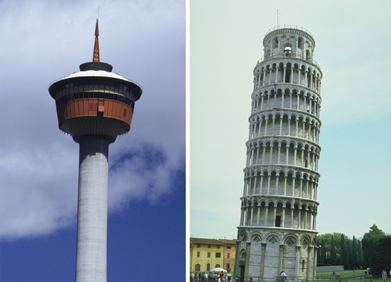Lesson 2
1. Lesson 2
Module 2: Trigonometry
Lesson 2: Solving Linear Trigonometric Equations
Focus

Calgary tower: Photodisc/Thinkstock; Tower of Pisa: AbleStock.com/Thinkstock
As shown with the semicircular arches, architecture makes extensive use of symmetry. Some of the world’s more impressive buildings are based on circle geometry. The Calgary Tower and the Leaning Tower of Pisa are significantly based on circle symmetry—the same symmetry you’re using to study trigonometry.
The circle symmetry in the Calgary Tower makes the Tower’s famous revolving restaurant possible. Circle symmetry also makes the structure resistant to earthquakes and strong winds. The Tower of Pisa could be seen as circle symmetry gone wrong. On closer examination, however, the symmetry is sound—an engineering error causes the tilt. The fact that the Leaning Tower of Pisa stands nearly 1000 years after construction was started speaks to the strength of the circle.
In Lesson 1 you used Primary Trigonometric Ratios: Formal Definitions to determine the two angles at which a boom repairing a semicircular arch would be 4 m above the ground. The equation to be solved was sin θ = 0.8. In Lesson 2 you will learn to use your calculator and symmetry to solve equations like these.
Outcomes
At the end of this lesson you will be able to
- explain how symmetry can be used to solve equations of the form sin θ = k, where −1 ≤ k ≤ 1
- solve equations of the form sin θ = k, where −1 ≤ k ≤ 1 (for each of sine, cosine, and tangent)
Lesson Question
In this lesson you will investigate the following question:
- How does circle symmetry help solve equations of the form sin θ = k, where −1 ≤ k ≤ 1?
Assessment
Your assessment may be based on a combination of the following tasks:
- completion of the Lesson 2 Assignment (Download the Lesson 2 Assignment and save it in your course folder now.)
- course folder submissions from Math Lab, Try This, and Share activities
- additions to Module 2 Glossary Terms and Formula Sheet
Materials
You will need the following supplies:
- three copies of Circle of Angles
- a pencil
- a ruler